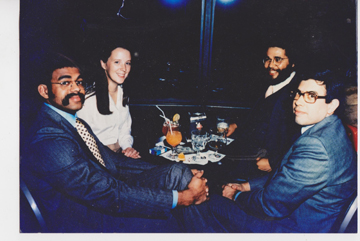Life After Chase: John "Johnny" Torrance-Nesbitt
From 20 Pine Street to Riyadh

John “Johnny” Torrance-Nesbitt still thinks his best job ever was working for Chemical Bank. His most adventurous job, however, may be his current one, as a contracted executive in employment branding for the Saudi Electric Company in Ryadh, Saudi Arabia.
The adventure is all the more remarkable in that Nesbitt is black, though with his skin tone he is often mistaken for Saudi or, more frequently, Sudanese. An American can overhear a lot in a foreign country when he isn’t taken to be an American.
Nesbitt worked at Chemical on the 18th floor at 20 Pine Street from early April 1977 to late fall 1980 as an Assistant Secretary, MBA & Executive Recruiter under personnel officer Tom Barile, a man Nesbitt calls a legend. He credits his career success to the solid grounding, training and friendship from Barile. Among the future long-term senior executives Nesbitt recruited off college campuses were Lewis P. Jones and Joseph Barragan.
After finishing his term in Management Recruitment, Nesbitt was accepted into the Metropolitan Bank intensive (BA) Credit Training program. His next stop was HSBC, as an AVP, Executive Recruiter.
An Amherst College graduate, he would complete an MBA at Rutgers (Newark/New Brunswick) before switching – temporarily – to Corporate Finance by joining First Chicago’s MBA Corporate Finance Program in downtown Chicago as a credit associate. He moved on to First Chicago Capital Markets.
He left corporate finance in 1996 to pursue a new position in Talent Acquisition/Recruiting with Lockheed Martin in Bethesda, Maryland, as head of corporate staffing. He subsequently moved to London to wed (and become a stepfather), returned to Chicago as director of global staffing for Unext LLC, and built Monsanto's first employer branding (EB) function. After Monsanto, Nesbitt led other talent acquisition functions at several firms before joining the global Recruitment Process Outsourcing (RPO) firm Randstad in 2014 as a RPO Employer Brand Director out of Atlanta.
Nesbitt is a published global writer in his field, both on-line and in print form for several EB outlets. He has served as a panelist for Recruitment Buzz (Wales, UK) writing, "How Employer Branding Can Help with Organizational Change Management" and "Senior Leaders Need Training in Employer Branding."
That brings us to his recruitment to the Saudi Electricity Company (the other SEC). “I chose the Saudi job in part because of my lifelong interest in other cultures, and also because I’d enjoyed an earlier experience working and living in another country,” he said, adding that Riyadh also brings him closer to his girlfriend in England.
The CAA asked him about his experience in Ryadh:
Was there a tradition of employer branding in SA, or did you need to bring the discipline there?
In a fulltime/dedicated and formal way, yes. I brought and am bringing principles of Employer Branding (EB) to the SEC. My job was a direct outgrowth of work begun in 2014/2015 but left unfinished by McKinsey. I was contacted by an SEC headhunter in July of 2015 via LinkedIn based on my global EB reputation. I Skype interviewed in September 2015 and joined on March 2016 in Saudi. Anyway, McKinsey’s work was very broad and involved all of HR and Talent Attraction and HR business Partners work at SEC. They conducted EB research and internal focus groups and created SEC’s Employer Value Proposition (the EVP), but that was it—they did not implement it or expand it or disseminate it broadly internally or externally via social media LinkedIn in etc.—that is what I am doing this year and the reason my work has been validated and renewed for 2017-2018 and beyond (hopefully).
So for starters, here, I quickly engaged three advertising agencies in the Gulf region to make proposals on EB to us. These proposals in the final analysis were very good but very expensive—ranging from US$270,000 through to US$ 3.1 million dollars. We in HR reviewed these proposals and decided to take a pass on these agency proposals. I was given the internal green light to do it myself–very exciting and rewarding stuff for me and for my EB team, which is led by a Saudi national.
What other cultural differences do you find in the utility company — employer/employee relationship, diversity issues, job security, training, etc.?
At SEC I work day to day with Saudis but also with Brits, Canadians, people from India, people from the Philippines, people from Greece, Turkey, and Sudan—exciting stuff. You always have to put your best foot forward here as an American in the Middle East, even on the elevator where I encounter many Saudis and try to represent my country in a positive manner. Non-Saudis here can be quite forward, and I was asked for whom I voted in the recent Presidential election. My friendly non-committal and polite response was: We Americans don’t casually discuss this openly, as we consider this a private matter.
Work stops at 12 noon, as the prayer rugs come out and people pray (this happens five times a day. If you are shopping when prayer time happens, you are stuck inside the establishment. Also, we Americans, Canadian and Brits have to plan our day and errands and shopping around prayer times. Fridays, things don’t open until 4:30 pm, but stay open till 2 am, due to the extreme heat. So shopping accommodates the weather, i.e., it is better to be shopping when the Saudi sun is down and it is midnight.
Saudis are friendly in general...and Saudis are nighthawks. I live in an apartment / hotel; routinely the Saudis are up until 4 am and 5 am – including the children (on non-school days). Take out fast food is being ordered and delivered up until 2 am.
There is no such thing as Diversity Training, etc. People here are mostly all Saudis, with few women in the work place. Job security exists if you are a native Saudi, but I am told layoffs can even happen there, especially with the price of oil being low relative to the Bush years.
Training and Development does not exist for ex-pats like me or Brits, etc. Put simply you are being hired because you are an expert and you need to transfer your knowledge to Saudis—so why should you need more training or even conference and workshop attendance for professional development?
The Employer/Employee relationship does not exist for us ex-pat contractors. You are not guaranteed employment beyond your contract terms.
By the way, as an ex-pat you have to apply to leave Saudi Arabia. You cannot just show up at the airport and leave—you need an exit/entry visa (1100 local currency, divide by 3.75 to convert to US dollars). The airport here is mob city and makes it a challenge to leave from it. They have about two or three checks before you even get to security, as if they are looking for any reason to deny you access to a flight out of here. It can be pretty scary, but the pay is exceptional. My compensation (salary, monthly severance contribution) is higher that that of my last U.S. job, and I also get a car driver allowance and hotel living support. Thank God for my driver, as driving here is like demolition derby – imagine NYC and London at (rainy) rush hour but with no rules of the road– unbelievable!
What’s it like to be a black American in Saudi Arabia? Are you a novelty? Have you encountered racism? curiosity?
So on race (glad you asked), I am a bit of an anomaly here. My Father is/was African-American from South Carolina, former slave stock “owned” by Scottish Nesbitts. My Mom’s heritage is/was Native American and Scot (from the Burnett clan) from North Carolina. So my skin complexion is confusing to Saudis and others here. They don’t know what I am if I don’t open my mouth. They start speaking Arabic, assuming (and I have been told this on elevators) that I am Saudi, Egyptian, Sudanese or East Indian (this one is absurd), rather than the just plain old vanilla U.S. black guy that I am. It is a shocker to me than a lot of the Saudi I see at work and in the stores I visit and on the street look like me and regular American black people – from their skin and hair types.
There’s been no overt racism experiences thus far. But as an American I do stand out at the company (which is fine in most cases at work) but unfortunate on the street. Because being in this place, you certainly want to keep a relatively low profile as an American—as there have been instances of people like me/us being run over on the street. When confronted with an overly curious local person in a store (not at the safe corporate environment where I work, mind you) who seems (just) dying to know what I am, I find myself totally avoiding the answer or claiming to be Sudanese—which most people mistake me for—since in the back of my mind I am struggling to discern why is this person so bloody curious about my origin. What is their motive?...call it my old Newark street smarts kicking in.
Overall, though, and in the spirit of your question, I am respected for being a well-educated and professional American at the company. Don’t forget that the government of Saudi Arabia and the United States have been allies since FDR/WWII, so Americans are welcomed here or at least tolerated.
You mention you have a multi-year contract. When is it up? Do you hope to stay in Saudi Arabia, or what comes next?
So I have home leave on March 15th and get to see my beautiful girlfriend in London for her March birthday. Then it's back over in Saudi on April 7th or so and with the new contract being signed for 2017 to April 2018. Hopefully there's one more year after that in Saudi and then I'll return to the good old USA to continue my Recruiting/Branding career or on to London where I have lived, to work in employer branding there. No slowing down and no rest for the weary!
A Chemical Bank recruiting dinner in San Francisco late September 1977. Torrance-Nesbitt is on the left, with Tom Barile on the right side of the frame. The recruit is Eric Brooks (who ultimately joined Chemical), joined by his wife.

